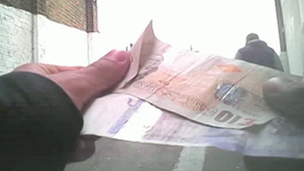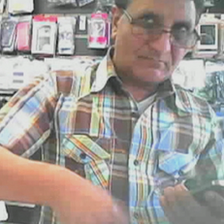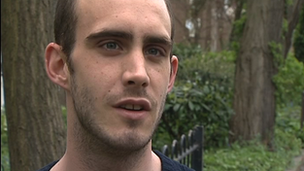'Black market' for stolen smartphones exposed
- Published
More than 30,000 phones have been stolen in London in the last year
A black market of shops and traders willing to deal in stolen smartphones has been exposed by a BBC London undercover investigation.
Intelligence was received that some shops across a swathe of east London were happy to buy phones from thieves.
Two traders were filmed buying Samsung S3 and iPhone 4 devices from a researcher posing as a thief - despite him making it clear they were stolen.
The shops involved have declined to comment.
On receiving tip-offs about numerous rogue businesses, eight used smartphones were acquired by lawful means.
Each smartphone was personalised with images and backgrounds with contacts added, calls made and messages sent.
They were then all blocked or reported stolen to the networks.
The undercover researcher then offered the phones for sale - typically with messages on the screens reading: "This mobile has been stolen. This phone has now been locked. You have been reported to the authorities."
The researcher offered a phone to London Mobiles Ltd in Ilford, saying: "I not buy, I steal, yeah?"
When shown the screen message, the employee laughed and said: "It's stolen. It's very dangerous."

One shop made the researcher go outside before handing over cash
That did not stop him offering cash for the phone.
Nearby Ask Mobiles and Computers in Seven Kings, bought four "stolen" mobile phones from the BBC, making the researcher leave the shop before concluding the deals for up to £40.
This was despite the researcher saying on his second visit: "Yeah bruv, I stole two more."
One worker even gave the researcher tips on evading arrest.
He said: "You're mental man, just turn it off, they can track you.
The researcher asked: "Turn it off?"
'Absolutely astounding'
And he was told: "Yeah 'cos they got Sim card inside, throw away the Sim."
The BBC showed its footage to John O'Connor, a former commander of the Met's Flying Squad.
He said: "You have got people so confident and so casual in dealing with what they believe to be stolen property - and encouraging robberies.
"I find it absolutely astounding.
"By providing a conduit for the thieves to be able to convert those stolen phones into money, they're encouraging the commission of offences."

"It's very dangerous" - buyer of 'stolen' phone
All the phones used had 'find-my-phone' style blocks activated, and in theory their IMEI numbers mean they are not useable once reported stolen.
But Grant Roughley, of Essential Forensics, demonstrated to the BBC how simple it was to get around such features - using only a laptop.
He was able to give a device a new IMEI number - effectively changing the phone's fingerprint - meaning it could be used as normal.
And restoring the phone's default software removes "find-my-phone" protection.
Mr Roughley said: "Just a few mouse clicks and the phone is turned from a paperweight back to a useable device again.
"A phone stolen this morning could be back on the streets by this afternoon, packaged up as a second hand legitimate phone."
A fundamental redesign of smartphones to place the IMEI number on a 'read-only' part of the device would prevent this. But Mr Roughley said manufacturers have been reluctant to do this.
Samsung and Apple have made no comment.
Carving knife
In total, the BBC received intelligence on some eight shops willing to trade in stolen smartphones.
And it is the victims of street robberies who know the true cost of the crimes rogue phone merchants encourage.

"I can't walk down the street at night on my own any more" - mugging victim
Alex Causton-Ronaldson, 25, a marketing manager, was left so traumatised after being held up with a carving knife in Clapham that he relocated from London to Norfolk.
He recalled: All of a sudden he came out with this huge knife.
"He said, 'Give me your phone now or I am going to stab you'.
"And all of sudden five other guys just appeared out of nowhere."
Mr Causton-Ronaldson added: "I broke down in tears.
"That's why I can't walk down the street at night on my own any more, it's ridiculous."